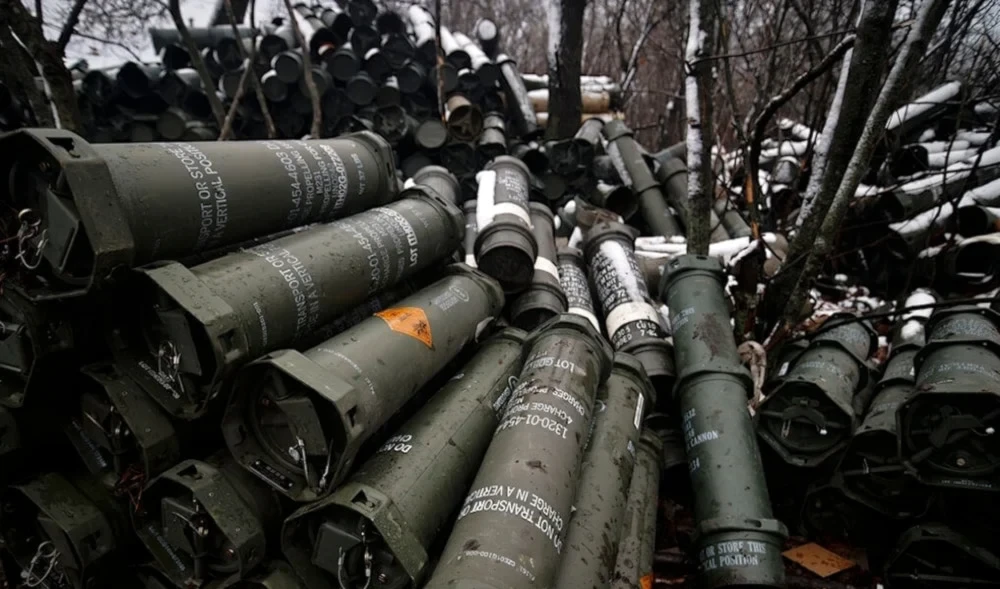Hegseth ordered pause to Ukraine arms without Trump approval: Reuters
Defense Secretary Pete Hegseth's move just days into Trump’s second term exposed internal disarray and blindsided the White House.
-

Ukrainian army artillery munitions are stored in the frontline at an undisclosed location in the Donetsk region, November 23, 2022 (AP)
Roughly a week after Donald Trump began his second term as president, the US military abruptly canceled 11 scheduled flights of artillery shells and weaponry bound for Ukraine. The decision, which originated from Defense Secretary Pete Hegseth’s office, temporarily disrupted key military assistance and blindsided top national security officials in Washington.
The order, issued verbally through the US Transportation Command (TRANSCOM), affected shipments from Dover Air Force Base in Delaware and Al Udeid Air Base in the United Arab Emirates. The halt triggered urgent inquiries from Ukrainian and Polish officials involved in coordinating the deliveries. However, senior figures in the White House, the Pentagon, and the State Department were unable to provide answers.
Within days, the flights resumed. But the incident, confirmed by TRANSCOM records reviewed by Reuters and five sources familiar with the matter, exposed confusion and a breakdown in decision-making at the highest levels of the Trump administration.
TRANSCOM caught in the middle of internal confusion
The cancellation followed a January 30 Oval Office meeting between Trump, Hegseth, and other senior security officials. During the discussion, the idea of pausing Ukraine aid was raised, but no formal directive was issued by the president, according to multiple sources with direct knowledge of the conversation.
Despite this, Hegseth’s office moved forward with halting the shipments. According to White House spokesperson Karoline Leavitt, Hegseth was acting on a general directive from the president. Still, the lack of communication with other senior officials and the swift reversal of the order raised questions.
“This is consistent with the administration's policy to move fast, break things and sort it out later,” said Mark Cancian, a defense expert at the Center for Strategic and International Studies. “That is great for Silicon Valley. But when you’re talking about institutions that have been around for hundreds of years, you are going to run into problems.”
TRANSCOM estimates that the canceled flights cost taxpayers $1.6 million. A more formal policy to halt military assistance, based on shipments authorized under the Biden administration, was only announced by the White House on March 4.
Ukraine military aid pause fuels uncertainty
The brief pause in February sparked concern in Kiev, where Ukrainian officials struggled to obtain clarity from Washington. One Ukrainian official later said the incident was described to them as “internal politics". Officials in Ukraine did not publicly comment on the cancellation.
The US weapons shipments to Ukraine, typically routed through a logistics hub in Poland, involve a multi-agency approval process and can take weeks to organize. It remains unclear whether other flights continued during the February disruption or how much aid was already stockpiled.
According to multiple sources, the February flights included equipment long approved by Congress and the Biden administration. Some of Hegseth’s closest advisors, many with no prior government experience and a history of opposition to US aid to Ukraine, reportedly encouraged the pause.
Decision-making breakdown and power struggles inside the Pentagon
One source stated that Hegseth entered the January 30 meeting with a memo drafted by his staff, urging a temporary pause in arms shipments to increase leverage in peace talks with Russia. National Security Advisor Mike Waltz and Ukraine envoy Keith Kellogg were also present at the meeting.
Though aid shipments had continued uninterrupted through Trump’s first weeks in office, the lack of a coordinated policy discussion before halting the flights signaled a breakdown in protocol. The pause came as Ukrainian forces faced increasing pressure from Russian advances in eastern Ukraine and the Kursk region.
Close Trump advisors, upon learning of the cancellation, discussed it with the president, with sources indicating that Waltz eventually intervened to restore the shipments. Waltz himself was later removed from his role and is reportedly set to be nominated as US ambassador to the United Nations.
Deepening factionalism inside the Trump administration
The Pentagon has since experienced internal upheaval. On April 15, several of Hegseth’s aides were escorted out over alleged leaks of classified information. Among them was Dan Caldwell, one of the secretary’s chief advisors on Ukraine and a vocal proponent of an "America First" approach to foreign policy.
Infighting between factions supporting continued engagement in Ukraine and those favoring a pullback has complicated the Trump administration’s ability to articulate a coherent security policy. While National Security Council officials like Kellogg and Trump ally Steve Witkoff have worked to broker a ceasefire with Russia, others within the Pentagon have pushed to scale back support for Kiev.
The divide reflects a broader ideological rift. Some officials argue the US should refocus on containing China rather than sustaining conflicts in Europe or the Middle East, a view aligned with Vice President JD Vance.
Meanwhile, Washington has pursued an agreement with Kiev for access to Ukraine’s rare earth minerals, which US officials see as partial repayment for American military aid.
Despite these tensions, the Trump administration has resumed delivering the final tranches of aid authorized under the Biden administration. However, no new Ukraine policy has been publicly announced, and the uncertainty surrounding the February cancellations continues to cast doubt on the administration’s cohesion and strategic clarity.

 5 Min Read
5 Min Read









